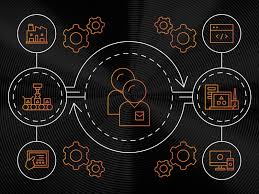Recent times have seen a significant rise in the intelligence and connectivity of industries. As a result, businesses have started using the latest technologies to stay ahead in the race. It includes data analytics, automation, IoT (Internet of Things), and machine learning. However, these tools have not been known to succeed independently. They must establish a connection and collaborate well. System integrators are useful in this situation.
What Is a System Integrator?
A system integrator is a person who combines many technologies to make them function as a single system. This encompasses devices, software, sensors, and other elements. Making sure all the components “talk” to one another is their responsibility. When you link everything, it becomes highly efficient, smarter, and quicker.
You should look for an establishment where the manufacturing line has been expanded. It should be inclusive of robots or a warehouse including sensors and cameras. However, these tools should cooperate along with being helpful. The system integrators are responsible for that.
Why Is System Integration Important?
Problems arise when systems do not cooperate. Data may not be shared by machines. Teams may utilize disparate, incompatible tools. Delays, mistakes, and additional human labor result from this.
System integrators fix this by:
Connecting machines and software
Automating boring or repetitive tasks
Ensuring data exchanges between teams
Developing solutions that expand with your company
Big Benefits of System Integration
Here are some reasons why working with a system integrator is a smart choice:
1. More Efficiency
With integrated systems, you can do more tasks in less time. Process slowdowns can be minimized and manual duties can be reduced.
2. Real-Time Monitoring
You have a single location to verify everything. As a result, you can monitor events in real time using dashboards. They enable you to detect problems quickly and take timely action.
3. Save Money
Integration may first appear costly. However, you can save money and time by lowering mistakes, downtime, and labor expenses.
4. Easier to Scale
Integrated systems make it simpler to extend and upgrade as your company expands. It won’t be necessary for you to start over.
5. Stay Competitive
Smart, networked businesses have been prepared for the future. They have been more agile and intelligent than people using outdated, disjointed tools.
Who Uses System Integrators?
Numerous sectors benefit from system integrators. Here are few instances:
Manufacturing: A seamless production flow is produced by connecting machines, robotics, and software.
Warehousing & Logistics: To expedite shipment, order systems, conveyors, and scanners are connected.
Energy & Utilities: Power distribution and usage are managed by synchronizing sensors and control systems.
Healthcare: To improve treatment and speed up service, patient data and medical equipment are linked.
Want to Learn More?
A system integrator consultation is a wonderful place to start if you are considering updating your company’s systems. They may describe how things fit together and which options suit you the best.
Final Thoughts
Your company’s progress may be hampered in this quick-paced world of today with disjointed systems. However, system integrators ensure proper and joint functioning of your tools and equipment. As a result, you save money, time, and prepare for the coming times. If you are looking forward to leveraging smarter technology and improving your operations, consider working with a system integrator.







